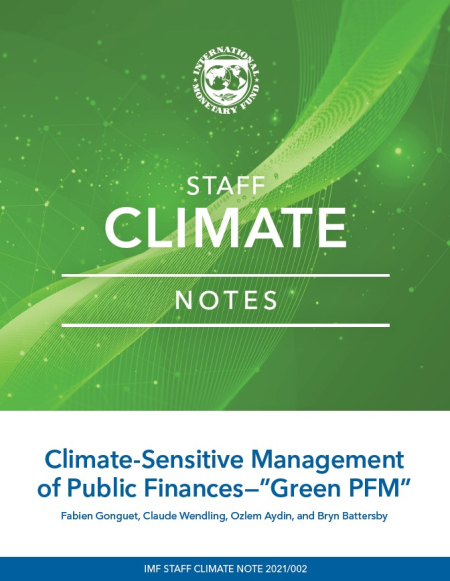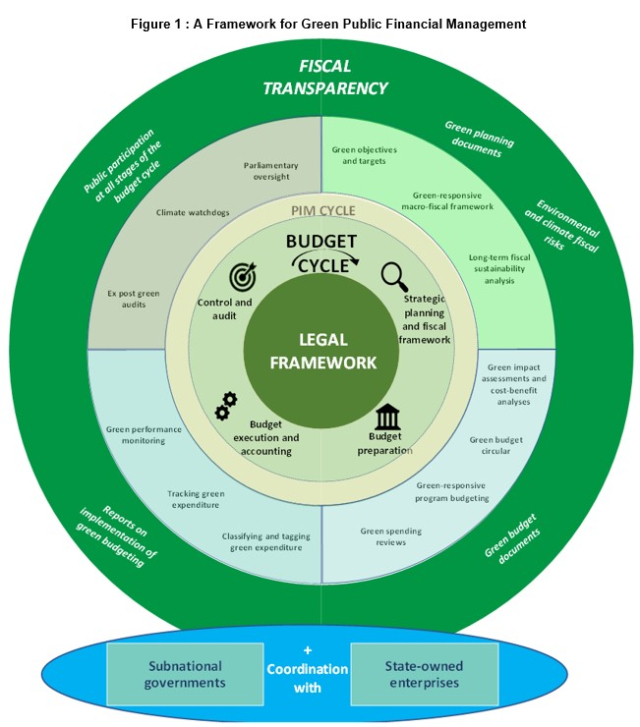
Posted by Manal Fouad, Fabien Gonguet, and Claude Wendling[1]
The International Monetary Fund (IMF) has just published a new note on “Climate-Sensitive Management of Public Finances – “Green PFM”. This note is the second instalment in the IMF Staff Climate Note series, which was inaugurated with a note on “Proposal for an International Carbon Price Floor among Large Emitters” published in June 2021.
The “Green PFM” note describes the framework proposed by IMF staff for adapting existing PFM practices to support climate-sensitive or more broadly environmental-friendly policies. It makes the case that, given the cross-cutting nature of climate change and wider environmental concerns, “green PFM” can be a key enabler for the implementation of an integrated government strategy to combat climate change.
While “green budgeting” is by no means a new topic (the first “green budget” was produced in the early 90s in Norway), the urgency of fighting climate change has increased the relevance of “mainstreaming” environmental concerns into PFM instruments, as attested by the creation in 2018 of the Paris Collaborative for Green Budgeting and Helsinki Principle 4 of the Coalition of Finance Ministers for Climate Action. IMF staff now bring their contribution to the discussion by proposing a conceptual framework and key principles for the sound implementation of green PFM reforms, applicable to all countries, regardless of their capacity levels.
The framework proposed underscores the need for an approach combining various entry points within the overall budget cycle (strategic planning and fiscal framework, budget preparation, budget execution and accounting, control and audit) and across and beyond the cycle (fiscal transparency, coordination of the central government with public corporations and subnational governments). This is set out in Figure 1 below, which outlines the main PFM areas where green concerns should be “mainstreamed”.
The IMF staff’s “Green PFM” framework also spells out five key principles to ensure a successful implementation of green PFM reforms.
First, some prerequisites are necessary for successful green PFM reforms, including having the basic elements of a functional PFM system already in place, building on significant political ownership, and developing some “green” expertise for key actors in the PFM processes. The latter may be demanding as staff attached to the central budget authority or other key PFM actors are not selected for their expertise in environmental or climate economics. Especially in low-capacity environments, tailored solutions may be needed to help institutions develop such skills through capacity development and additional recruitments.
Second, while green PFM reforms constitute a whole-of-government undertaking, the Ministry of Finance as the custodian of public resources should be in the driver’s seat. Line ministries – with the Ministry of Environment at the forefront – and other actors have an important technical role to play, but the Ministry of Finance will have the required mastery of PFM processes to assess how green elements can be instilled into these processes.
Third, green PFM reforms should be integrated with the existing PFM reform agenda. For example, the shift to program budgeting, an important PFM reform in many countries, can provide an opportunity to enhance monitoring of environmental outputs and outcomes.
Fourth, countries should look for a smart sequencing of green PFM reforms. Most of the time, this means starting with green PFM reforms touching upon the budget formulation process, for example developing the capacity to assess ex ante green impacts of fiscal policies, before moving downstream, for example measuring actual results and impacts and comparing them to ex ante objectives. Gradually rolling out reforms, notably through the use of pilots, can also be helpful.
The fifth and last principle relates to the importance of adequately communicating on green PFM reforms to ensure buy-in from all stakeholders and to manage expectations.
A forthcoming How-To Note will expand on this Climate Note with more specific details on the framework and a wide range of existing country practices. Going forward, the IMF’s Fiscal Affairs Department will disseminate this framework through workshops and trainings. It also stands ready to provide capacity development support to governments of IMF member countries wishing to develop and implement a green PFM reform strategy.
[1] All authors belong to the IMF’s Fiscal Affairs Department.
Note: The posts on the IMF PFM Blog should not be reported as representing the views of the IMF. The views expressed are those of the authors and do not necessarily represent those of the IMF or IMF policy.








